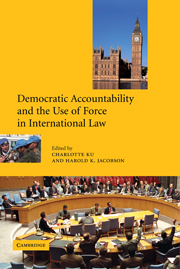Book contents
- Frontmatter
- Contents
- List of figures
- List of tables
- Notes on contributors
- Preface
- List of abbreviations
- I Introduction
- II The domestic and international context
- 2 The interface of national constitutional systems with international law and institutions on using military forces: changing trends in executive and legislative powers
- 3 Domestic political factors and decisions to use military forces
- 4 Collective security, peacekeeping, and ad hoc multilateralism
- 5 The legal responsibility of military personnel
- III Traditional contributors to international military operations
- IV Newcomers to international military operations
- V Permanent members of the UN Security Council
- VI Conclusion
- Appendix A. Uses of military forces under the auspices of the UN and NATO
- Appendix B. Country participation in international operations, 1945–2000
- References
- Index
3 - Domestic political factors and decisions to use military forces
Published online by Cambridge University Press: 30 July 2009
- Frontmatter
- Contents
- List of figures
- List of tables
- Notes on contributors
- Preface
- List of abbreviations
- I Introduction
- II The domestic and international context
- 2 The interface of national constitutional systems with international law and institutions on using military forces: changing trends in executive and legislative powers
- 3 Domestic political factors and decisions to use military forces
- 4 Collective security, peacekeeping, and ad hoc multilateralism
- 5 The legal responsibility of military personnel
- III Traditional contributors to international military operations
- IV Newcomers to international military operations
- V Permanent members of the UN Security Council
- VI Conclusion
- Appendix A. Uses of military forces under the auspices of the UN and NATO
- Appendix B. Country participation in international operations, 1945–2000
- References
- Index
Summary
There is little systematic information about why states choose to make substantial commitments to multilateral security activities. Much of the literature points to states as unitary actors acting according to national interests, yet the unitary actor approach does not provide an appropriate framework for analyzing decisions in democracies to have forces deployed under international institution auspices. Even in the case of established democracies, enabling or constraining domestic considerations are curiously missing from most of the literature. This book fills this gap.
This chapter examines factors relevant to the decision of democratic states to commit to using force under international auspices. Scholars need to break open the shell of the unitary state and probe multiple, often conflicting, interests of the political culture; domestic political relationships, including the military; and societal groups. This task is especially important in discussing democracies, since they provide key leadership for peacekeeping and enforcement actions.
This chapter focuses on cultural, political, and societal factors which are part of the calculus of a democratic state's decision to make and keep an international commitment to use force. Both formal constitutional provisions and informal practices developed over time make a difference. After all, democracy is a system in which elites are held accountable for their actions and decisions. To what extent do formal and informal domestic political and societal factors explain the commitments they make?
In focusing on domestic factors, the chapter builds on Lori Damrosch's chapter on state legal structures.
- Type
- Chapter
- Information
- Publisher: Cambridge University PressPrint publication year: 2003
- 1
- Cited by



